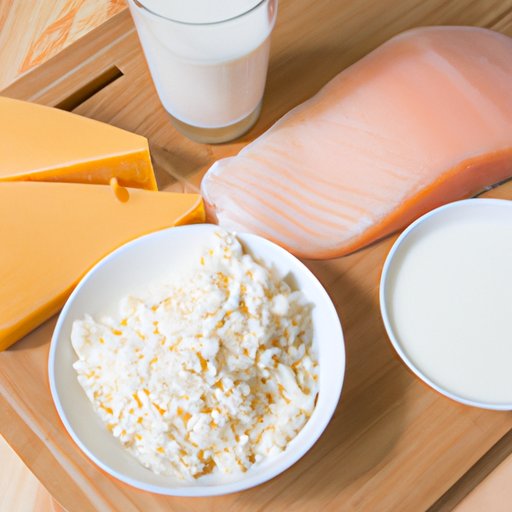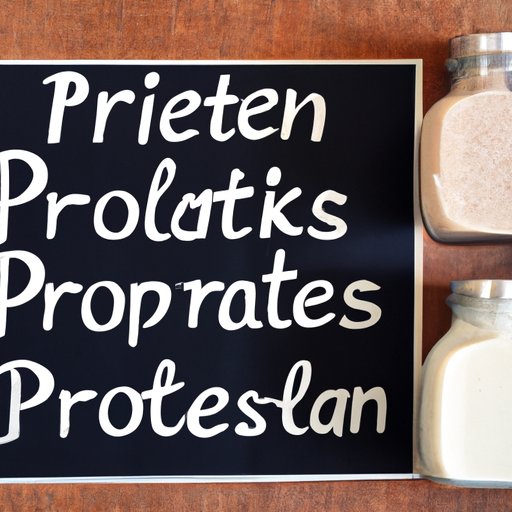
Introduction
When it comes to losing weight, the role of protein cannot be overstated. Eating more protein can help curb cravings, build muscle, and improve your overall body composition. But how much protein do you actually need to eat to lose weight?
In this article, we’ll explore the science of protein and weight loss, how to calculate your protein needs, the optimal amount of protein for weight loss, and strategies for incorporating protein into your diet.
The Science of Protein: Why It Matters for Weight Loss
Protein is an essential macronutrient that plays a crucial role in weight loss. When you eat protein, it triggers the release of satiety hormones, helping you feel full and reducing your overall calorie intake. Additionally, protein has a high thermic effect, meaning that it requires more energy to digest compared to other macronutrients.
Eating a high-protein diet also helps preserve muscle mass while losing fat, which is critical for maintaining overall health and body composition.
On the flip side, not getting enough protein can lead to muscle loss, slower metabolism, and increased hunger.
Calculating Your Protein Needs for Effective Weight Loss
While the recommended daily allowance (RDA) for protein is 0.8g/kg of body weight, this amount may not be sufficient for those looking to lose weight or build muscle. In general, a safe and effective range of protein intake for weight loss is 1.2 to 1.6g/kg of body weight.
However, it’s important to note that protein requirements may vary depending on factors like age, sex, activity level, and fitness goals. To calculate your protein needs, multiply your weight in kilograms by 1.2-1.6.
For example, a 150-pound woman (68kg) looking to lose weight would need between 82-109g of protein per day.
Maximizing Your Weight Loss with the Right Amount of Protein
Studies have shown that a higher protein intake can lead to greater weight loss and fat loss compared to lower protein diets. To maximize your weight loss efforts, aim for at least 25-30% of your total daily calories to come from protein.
Some easy ways to incorporate protein into your meals include adding protein powder to your smoothies, including lean meats like chicken and turkey in your meals, and snacking on things like Greek yogurt, cottage cheese, or hard-boiled eggs.
Additionally, spreading your protein intake evenly throughout the day can help regulate appetite and prevent hunger cravings.
The Role of Protein in Reducing Hunger and Losing Weight
One of the most significant benefits of consuming protein while trying to lose weight is its ability to curb hunger and reduce overall calorie intake. Several studies have shown that diets high in protein can lead to reduced appetite, increased satiety, and improved weight loss.
Protein can also help maintain muscle mass while losing weight, which is essential for preventing a sluggish metabolism and preserving overall health.
Some effective ways to incorporate more protein into your diet include snacking on high-protein foods like jerky, nuts, or protein bars, and swapping high-carb snacks like chips or crackers for protein-rich alternatives like homemade protein balls or roasted chickpeas.
Protein and Weight Loss: Finding the Sweet Spot
While consuming more protein can help with weight loss, it’s important not to overdo it and consume too much protein, which can be detrimental to your health.
Studies have shown that a safe and effective amount of protein intake for weight loss is between 25-30% of your total daily calorie intake. Consuming significantly more than this can put unnecessary stress on your kidneys, increase your risk of heart disease, and lead to overeating and weight gain.
To find the sweet spot for your protein intake, experiment with different amounts of protein and track your results. If you’re not seeing progress with your weight loss goals, try increasing your protein intake slightly and see how your body responds.

How to Incorporate Protein into Your Weight Loss Plan
There are many different types of high-protein foods to choose from, including animal-based sources like chicken, beef, and fish, as well as plant-based options like tofu, tempeh, and legumes. For vegetarians and vegans, incorporating protein into your diet can be challenging, but it’s still possible by eating things like whole grains, nuts and seeds, and plant-based protein powders.
One effective way to ensure that you’re getting enough protein is to meal plan and prep in advance. Some high-protein meal ideas include grilled chicken with roasted vegetables, black bean tacos with avocado, or a quinoa and vegetable stir-fry.
The Importance of Protein Quality When Trying to Lose Weight
Not all protein is created equal, and choosing high-quality protein sources is essential for optimal health and weight loss.
Lean protein sources like chicken, turkey, fish, and eggs are excellent options for weight loss, as they are low in calories and fat. Plant-based sources of protein like tofu, tempeh, and legumes are also great options for vegetarians and vegans.
On the flip side, consuming large amounts of animal-based protein, especially from processed and red meat, can increase your risk of heart disease and other chronic illnesses. Aim to balance your protein intake between animal and plant-based sources and opt for lean proteins whenever possible.
Conclusion
Incorporating more protein into your diet is an effective way to lose weight, build muscle, and improve your overall health and body composition. To maximize your weight loss efforts, aim for at least 25-30% of your daily calories to come from protein, and choose high-quality protein sources like lean meats, plant-based proteins, and low-fat dairy products.
By taking the time to calculate your protein needs, experiment with different protein sources, and track your results, you can find the ideal protein balance for your weight loss goals.





